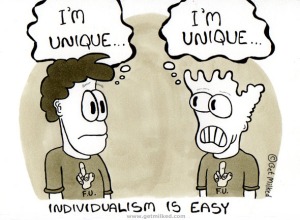“Culture is more often a source of conflict than of synergy. Cultural differences are a nuisance at best and often a disaster.” G.Hofstede.
What makes America, America ? What are the values that Americans hold? These are the questions we ask the most when we think about America. Two values I have chosen to discuss and compare to Belgian values are individualism and work ethic.
I. INDIVIDUALISM
What does individualism actually mean ? According to the Britannica Encyclopedia Online, it is the « political and social philosophy that emphasizes the moral worth of the individual. » The individualist would focus on his or her goals and desires in the first place rather than promote the collective approach. We understand then that individualism is the opposite of collectivism. Individualistic societies are societies in which people are expected to look after themselves. This is the case in America, and the famous « American Dream » is a good representation of this strong, individualistic belief. As you read stories about the American Dream (John Steinbeck’s Of Mice and Men is a good example) you will usually find people coming to the USA alone in order to have a better life- and fighting to have a higher standard of living than their parents did and to raise themselves from poverty. Geert Hofstede is a Dutch social psychologist who did a pioneering study of cultures across modern nations. To compare individualism in the United States and in other countries, Geert Hofstede divides the culture into five dimensions.
- PDI is the power distance index. This shows the degree of cultural acceptance of unequal status and power between individuals. This dimension indicates the degree of respect shown by the people towards their hierarchy and authority.
- IDV is the individualism. It expresses the freedom degree of an individual towards a group. In other words it expresses the degree of autonomy towards the group, social norms, and commitment to community values.
- MAS is for the masculinity. The question is whether a company is on the one hand somewhat more sensitive to emotional factors (female) or factual (male) and on the other hand organized with a clear separation or mixed up with both gender working together in the tasks of everyday life.
- UAI represents the uncertainty avoidance index. This refers to the degree that a culture of tolerance can accept towards the anxiety caused by future events. The relationship of uncertainty is different in each society. Some use forecasts and devices to handle events (such as Vigipirate, the French security devise meant to prevent threat or terrorist attacks).
- Finally we have the LTO (long-term orientation). The values associated with short-term orientation are the respect for traditions and the fulfillment of social duties. The values associated with a long-term orientation (so-called “truth”) are economy and perseverance.
|
Country |
PDI | IDV | MAS | UAI | LTO |
| USA | 40 | 91 | 62 | 46 | 29 |
| Australia | 36 | 90 | 61 | 51 | 31 |
| United Kingdom | 35 | 89 | 66 | 35 | 25 |
| Netherlands | 38 | 80 | 14 | 53 | 44 |
| New Zealand | 22 | 79 | 58 | 49 | 30 |
| Italy | 50 | 76 | 70 | 75 | |
| Belgium | 65 | 75 | 54 | 94 | |
| Denmark | 18 | 74 | 16 | 23 | |
| France | 68 | 71 | 43 | 86 | |
| Sweden | 31 | 71 | 5 | 29 | 33 |
| Ireland | 28 | 70 | 68 | 35 | |
| Norway | 31 | 69 | 8 | 50 | 20 |
| Switzerland | 34 | 68 | 70 | 58 | |
| Germany | 35 | 67 | 66 | 65 | 31 |
| South Africa | 49 | 65 | 63 | 49 | |
| Finland | 33 | 63 | 26 | 59 | |
| Poland | 68 | 60 | 64 | 93 | |
| Czech Republic | 57 | 58 | 57 | 74 | |
| Austria | 11 | 55 | 79 | 70 | |
| Hungary | 46 | 55 | 88 | 82 | |
| Israel | 13 | 54 | 47 | 81 | |
| Spain | 57 | 51 | 42 | 86 | |
| India | 77 | 48 | 56 | 40 | 61 |
| Argentina | 49 | 46 | 56 | 86 | |
| Japan | 54 | 46 | 95 | 92 | 80 |
| Jamaica | 58 | 41 | 43 | 59 | |
| Brazil | 45 | 39 | 68 | 13 | |
| Egypt | 69 | 38 | 49 | 76 | 65 |
| Iraq | 80 | 38 | 52 | 68 | |
| Turkey | 66 | 37 | 45 | 85 | |
| Uruguay | 61 | 36 | 38 | 100 | |
| Greece | 60 | 35 | 57 | 112 | |
| Philippines | 94 | 32 | 64 | 44 | 19 |
| Mexico | 81 | 30 | 69 | 82 | |
| Ethiopia | 64 | 27 | 41 | 52 | 25 |
| Malaysia | 104 | 26 | 50 | 36 | |
| Hong Kong | 68 | 25 | 57 | 29 | 96 |
| Chile | 63 | 23 | 28 | 86 | |
| China | 80 | 20 | 66 | 40 | 118 |
| Ghana | 77 | 20 | 46 | 54 | 16 |
| Singapore | 74 | 20 | 48 | 8 | 48 |
| Thailand | 64 | 20 | 34 | 64 | 56 |
| El Salvador | 66 | 19 | 40 | 94 | |
| South Korea | 60 | 18 | 39 | 85 | 75 |
| Taiwan | 58 | 17 | 45 | 69 | 87 |
| Peru | 64 | 16 | 42 | 87 | |
| Costa Rica | 35 | 15 | 21 | 86 | |
| Indonesia | 78 | 14 | 46 | 48 | |
| Pakistan | 55 | 14 | 50 | 70 | |
| Colombia | 67 | 13 | 64 | 80 | |
| Venezuela | 81 | 12 | 73 | 76 | |
| Panama | 95 | 11 | 44 | 86 | |
| Ecuador | 78 | 8 | 63 | 67 | |
| Guatemala | 95 | 6 | 37 | 101 |
Of course we notice that the United States have the highest individualism score (91). Belgium closely follows the US with a IDV score of 75. When we take a closer look to the countries at the top, we notice that all of these countries are developed countries. And that brings me to the conclusion that people living in an industrialized country will have the tendancy to develop a individualistic beliefs. In these societies it does not matter who you are. What matters is what you do, which means that people have to notice YOU and not your neighbor. That is why people have developed this tendency to work, to act and live for themselves.
II. WORK ETHIC
The second value I have chosen to discuss is work ethic. The American work ethic is « Work hard and you will be rewarded “right here right now”». I wrote “right here right now” between quotation marks because originally, the work ethic came from the Bible, which says “you will be rewarded one day”. However, this was before religious belief has been placed second next to the first and most attractive thing in the world: money. One might wonder why Americans want to work so hard. First of all we have to remember that consumerism is king in America so if people want to afford all the objects that they desire, work is essential. Also, many Americans think that if you work really hard all your life, when you retire you will be able to relax and enjoy the fruits of your labor. In Belgium we have similar mindset, but it is less extreme. We have to work because no work means no money and no money means… you will not have the means to live.
Laura Petrussa.
Sources :
– Images : http://www.getmilked.com/comics/IndividualismIsEasy.html & http://www.freakingnews.com/Gothic-Work-Ethic-Pictures-85344.asp

